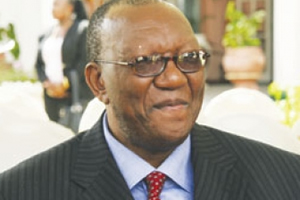Zim has enough seed
via ‘Zim has enough seed’ | The Herald
There is enough seed in the country to meet farmers’ requirements this season, although fertiliser supply remains a challenge, outgoing Minister of Agriculture, Mechanisation and Irrigation Development Joseph Made has said.

Minister Made – courtesy the Herald
The minister said an appeal was being made to President Mugabe to expand his presidential well-wishers input support programme.
President Mugabe has for years been single-handedly sponsoring farming to ensure food security at household level after outgoing Finance Minister Tendai Biti ditched the sector for political expedience.
Minister Made appealed to President Mugabe to continue his Presidential well-wishers input support programme that supported farmers throughout the tenure of the inclusive Government.
“Remember the Presidential well-wishers programme single-handedly, is what supported our farmers for the past five years. Again our appeal is once more to the President that as per the Zanu-PF manifesto that programme is also continued if not expanded,” Minister Made said.
Weather experts have predicted normal to above normal rains for Sadc countries during the 2013/2014 farming season, while Zimbabwe’s specific rainfall patterns are expected on Wednesday.
In an interview last week, Minister Made said Government’s immediate task was to ensure farmers accessed inputs on time this year to avoid food shortages.
“The immediate task of Government is really to have seed supported. Fortunately, the seed houses have indicated there is enough seed to the extent of 52 000 metric tonnes of seed in the warehouses.
“Unfortunately because of the activities of the past five years (Inclusive Government era), we owe seed houses money which we have not been able to give them,’’ he said.
According to an Agritex official who declined to be named, the country needs between 42 000 and 45 000 tonnes of seed, while between 300 000 and 400 000 tonnes are required to cover between 1,7 million and two million hectares of maize.
However, Chemplex Corporation Limited boss and the fertiliser industry spokesperson, Mr Misheck Kachere, said he could not give figures of the amount of fertiliser available in warehouses as he was attending business meetings outside the country.
Minister Biti was reluctant to support farmers on grounds that Zanu-PF believed were aimed at frustrating Government’s land reform.
“We owe the fertiliser companies money and the appeal from agriculture would be obviously that payment be made quickly to those two sets of sub-sectors that provide the primary materials that we use for the agricultural season so that they are able to continue their business operations.
“That is the important task to make sure that those companies are looked at from that point of view,” Minister Made said.
He said both small-scale and A2 farmers needed support from Government to ensure a successful farming season.
“Focus should be given to those areas with better rains. Every effort should be made so that we do not leave that land lying idle.
“It must be the effort of the farmer and then intervention that Government can come up with. The primary intervention is fertiliser and seed. Seed is enough, fertiliser no. Fertiliser is a different story,” Minister Made said.
He bemoaned the current electricity challenges facing the country saying load shedding was negatively impacting on fertiliser production and the whole agriculture sector.
Minister Made said the fertiliser industry must be given constant electricity supply as failure to do so will have ripple effect on agriculture.
He also spoke about the predicted rainfall patterns.
“When weather patterns say normal to above normal rains, it means that we are likely to have soil leaching. That is the double edge of better rains. It means soil leaching.
“The reason why I am emphasising this is because the Ammonium Nitrate and Compound D fertiliser must be manufactured almost simultaneously so that as your crop gets knee height you top dress it immediately before the fertiliser that is in the soil is leached,” Minister Made said.
“What is central and critical is that the planning is ready. It is on the table but the bigger challenge is mobilisation of resources, otherwise the farmer is ready.
“They are preparing. We just hope that now we deal squarely with paying farmers and paying the industry that supports the agriculture sector.”
